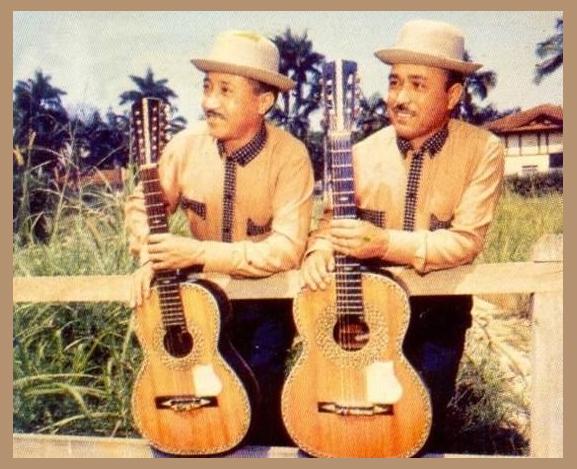 Zé Pagão e Fostino
Zé Pagão e Fostino
Zé Pagão e Fostino: The Dynamic Duo of Brazilian Music
In the annals of Brazilian music, the names Zé Pagão and Fostino stand tall as pioneers of the "forró" genre. Their iconic song "Briga de Casado" has become synonymous with the flamboyant spirit of their performances and the enduring power of their partnership.
Early Days and Inspirations:
Zé Pagão (born José Ricardo da Silva) and Fostino (born Francisco Ferreira de Sousa) hailed from humble beginnings in the northeastern state of Ceará. As children, they were captivated by the sounds of traditional Brazilian dance music, especially the lively forró rhythms.
Inspired by the likes of Luiz Gonzaga and Jackson do Pandeiro, the duo began performing together in the early 1980s. Their raw energy, infectious harmonies, and charismatic stage presence quickly gained them a loyal following.
Challenges and Controversies:
Zé Pagão e Fostino's rise to fame was not without its challenges. Their explicit lyrics and raucous performances often drew criticism from conservative elements in Brazilian society. In 1987, they were arrested for obscenity after a particularly raunchy concert.
Despite the controversies, the duo remained steadfast in their commitment to their music and their fans. They continued to push boundaries, incorporating elements of rock, pop, and even funk into their forró sound.
Discographic Legacy:
Zé Pagão e Fostino released a string of successful albums throughout their career, including "Briga de Casado" (1985), "Zé Pagão e Fostino" (1987), and "Só Forró" (1990). Their songs, such as "Lamento Sertanejo," "Morena Tropicana," and "Xote dos Milagres," became instant classics.
Members and Dynamics:
Zé Pagão was the lead singer and main songwriter, known for his raspy vocals and provocative lyrics. Fostino provided the intricate accordion accompaniment and served as the perfect foil to Zé Pagão's flamboyant stage persona.
The duo's relationship was not always smooth sailing, with clashes of ego and creative differences occasionally surfacing. However, their shared love of music and the unwavering support of their fans kept them together for over two decades.
Legacy and Impact:
Zé Pagão e Fostino's legacy extends far beyond their impressive discography. They played a pivotal role in popularizing forró music throughout Brazil and beyond. Their ability to fuse traditional elements with modern influences laid the groundwork for a new generation of Brazilian musicians.
Despite their passing in 2006 and 2009, respectively, Zé Pagão and Fostino remain icons of Brazilian music, their songs continuing to resonate with audiences of all generations. Their infectious energy, provocative lyrics, and unyielding spirit have cemented their place in the pantheon of musical legends.
In the annals of Brazilian music, the names Zé Pagão and Fostino stand tall as pioneers of the "forró" genre. Their iconic song "Briga de Casado" has become synonymous with the flamboyant spirit of their performances and the enduring power of their partnership.
Early Days and Inspirations:
Zé Pagão (born José Ricardo da Silva) and Fostino (born Francisco Ferreira de Sousa) hailed from humble beginnings in the northeastern state of Ceará. As children, they were captivated by the sounds of traditional Brazilian dance music, especially the lively forró rhythms.
Inspired by the likes of Luiz Gonzaga and Jackson do Pandeiro, the duo began performing together in the early 1980s. Their raw energy, infectious harmonies, and charismatic stage presence quickly gained them a loyal following.
Challenges and Controversies:
Zé Pagão e Fostino's rise to fame was not without its challenges. Their explicit lyrics and raucous performances often drew criticism from conservative elements in Brazilian society. In 1987, they were arrested for obscenity after a particularly raunchy concert.
Despite the controversies, the duo remained steadfast in their commitment to their music and their fans. They continued to push boundaries, incorporating elements of rock, pop, and even funk into their forró sound.
Discographic Legacy:
Zé Pagão e Fostino released a string of successful albums throughout their career, including "Briga de Casado" (1985), "Zé Pagão e Fostino" (1987), and "Só Forró" (1990). Their songs, such as "Lamento Sertanejo," "Morena Tropicana," and "Xote dos Milagres," became instant classics.
Members and Dynamics:
Zé Pagão was the lead singer and main songwriter, known for his raspy vocals and provocative lyrics. Fostino provided the intricate accordion accompaniment and served as the perfect foil to Zé Pagão's flamboyant stage persona.
The duo's relationship was not always smooth sailing, with clashes of ego and creative differences occasionally surfacing. However, their shared love of music and the unwavering support of their fans kept them together for over two decades.
Legacy and Impact:
Zé Pagão e Fostino's legacy extends far beyond their impressive discography. They played a pivotal role in popularizing forró music throughout Brazil and beyond. Their ability to fuse traditional elements with modern influences laid the groundwork for a new generation of Brazilian musicians.
Despite their passing in 2006 and 2009, respectively, Zé Pagão and Fostino remain icons of Brazilian music, their songs continuing to resonate with audiences of all generations. Their infectious energy, provocative lyrics, and unyielding spirit have cemented their place in the pantheon of musical legends.